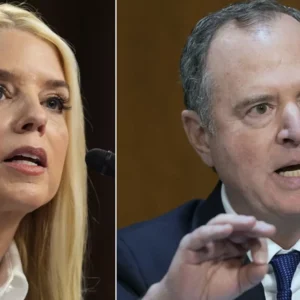What began as a routine confirmation hearing for Attorney General nominee Pam Bondi quickly escalated into a fiery confrontation, particularly during an exchange with Senator Adam Schiff (D-CA). The hearing, intended to evaluate Bondi’s qualifications and legal philosophy, took a dramatic turn when Schiff pressed her on critical legal matters, including prosecutorial discretion and the handling of presidential pardons.
As part of his questioning, Schiff raised concerns about how Bondi would approach politically sensitive cases, particularly those involving executive power. He specifically inquired whether she would pledge independence from the White House in decisions involving presidential pardons or investigations of government officials. His pointed questions sought to gauge whether Bondi would act impartially or whether she might offer legal protections to allies of the administration.
In response, Bondi remained firm, asserting that she would uphold the rule of law and maintain the integrity of the Justice Department. However, the tension in the room escalated when she brought up Schiff’s own censure by Congress, referencing the political controversy surrounding his handling of investigations into former President Donald Trump. Schiff, visibly irritated, dismissed the reference as irrelevant to the discussion at hand, but Bondi stood her ground, emphasizing the importance of credibility and accountability in public service.
The exchange underscored a broader ideological battle over the Justice Department’s independence, with Schiff expressing concerns that Bondi could potentially align too closely with the administration’s interests. He continued pressing for specifics on how she would handle legal challenges involving executive overreach and whether she would investigate potential misconduct without partisan influence.
At one point, the discussion became particularly heated when Schiff questioned Bondi’s role in previous high-profile legal matters, including her handling of fraud allegations against Trump University during her tenure as Florida Attorney General. He suggested that her past decisions raised ethical concerns regarding political favoritism. Bondi, however, countered by defending her record, insisting that every legal decision she made was based on evidence and legal merit, not political considerations.
The issue of presidential pardons proved to be one of the most contentious topics of the hearing. Schiff sought a commitment from Bondi that she would not approve or facilitate pardons for individuals convicted of crimes tied to political corruption or obstruction of justice. Bondi refused to engage in hypothetical scenarios, instead emphasizing that each case would be evaluated based on facts and legal precedent.
Republican members of the committee came to Bondi’s defense, arguing that Schiff’s line of questioning was politically motivated. They accused him of grandstanding and attempting to undermine Bondi’s confirmation by rehashing partisan grievances rather than focusing on her qualifications and experience.
Meanwhile, Bondi’s supporters pointed to her record as Florida’s Attorney General, highlighting her work on combating human trafficking, opioid abuse, and consumer protection. They emphasized that she has a strong legal background and is well-equipped to serve as Attorney General.
The hearing ultimately reflected the deep divisions in Washington, particularly regarding oversight of the executive branch and the politicization of the Justice Department. While Democrats pushed for firm commitments on prosecutorial independence, Republicans framed the hearing as an attempt to discredit a qualified nominee based on past political battles.
As the confirmation process moves forward, Bondi’s responses during the hearing will likely be scrutinized by both sides. While she projected confidence and a commitment to upholding the law, concerns about political loyalty and ethical considerations remain central to the debate over her nomination.
With a narrowly divided Senate, Bondi’s confirmation could hinge on moderate lawmakers who will have to decide whether her assurances of impartiality are sufficient to secure their support. Regardless of the outcome, the contentious nature of the hearing underscores just how politically charged Attorney General nominations have become in the current political landscape.
